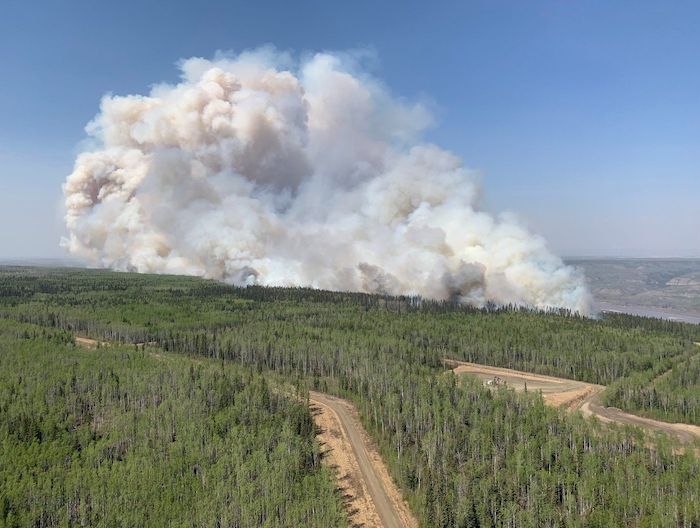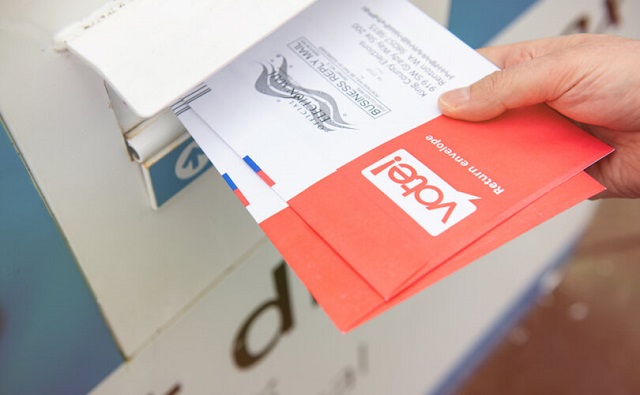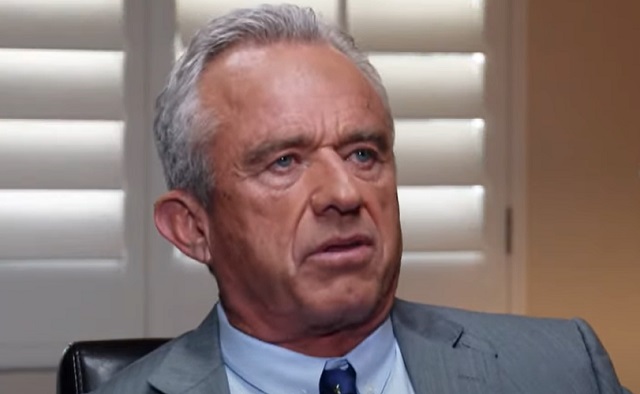Alberta
Alberta wildfire situation (May 8, 6:00 p.m.)

More than 29,000 individuals have been evacuated from communities throughout north and central Alberta.
Those evacuated due to wildfires should register at local reception centres or at emergencyregistration.alberta.
Current situation
- Alberta has declared a provincial state of emergency. Visit alberta.ca/emergency for information or call 310-4455, now available 24-7.
- The evacuation for the town of Edson as well as central and eastern parts of Yellowhead County has lifted. Some areas remain under evacuation order.
- The Big Lakes County evacuation order has been downgraded to a one-hour evacuation alert. Large portions of the affected area currently have no electrical power or natural gas services.
- The mandatory evacuation notice has been lifted in Northern Sunrise County. Residents are now allowed to return to their homes.
- Mandatory evacuation orders remain in effect for the following areas. Please check alberta.ca/emergency or download the Alberta Emergency Alert mobile app for complete information:
- Parts of Brazeau County, including the town of Drayton Valley. Evacuees should register in Edmonton at the Expo Centre, Hall C, at 7515 118 Avenue.
- The entire town of Rainbow Lake. Evacuees should register in High Level at the High Level Arena, at 10101 105 Avenue.
- Fox Creek, Little Smoky and surrounding areas. Evacuees should register at the Allan and Jean Millar Centre, at 58 Sunset Boulevard in Whitecourt.
- Parts of Sturgeon Lake Cree Nation and the Municipal District of Greenview. Evacuees should register at Memorial Hall, 4808 50 Street in Valleyview.
- Parts of the County of Grande Prairie. Evacuees should register at the Bonnets Energy Centre, 10017 99 Avenue, Grande Prairie.
- Parts of Big Lakes County. Evacuees should register at Elks Rodeo Hall on Highway 749.
- Parts of Lac Ste. Anne County. Evacuees should register at the Mayerthorpe Diamond Centre, at 4184 54 Street.
- Parts of Yellowhead County (east of Range Road 110 and east of Range Road 101 and south of Township Road 560). Evacuees should register at the Dr. Duncan Murray Rec Centre, 805 Switzer Drive, Hinton, or at the Jasper Fitness & Aquatics Centre, at 305 Bonhomme Street, Jasper.
- Parkland County and the Hamlet of Entwistle. Evacuees should register at Wabamun Jubilee Hall, at 5132 53 Avenue in Wabamun.
- Residents of the following areas should be prepared to evacuate on short notice:
- The Grovesdale area of the Municipal District of Greenview.
- Clearwater County in the area west of Beaverdam Provincial Recreation Area and east of the Bighorn Dam, including the hamlet of Nordegg.
- Parts of the County of Grande Prairie, including the Pipestone Creek area.
- The town of Valleyview.
- Lac St. Anne County, in the area north of Township Road 560 and south of Highway 43, and between Range Road 60 to 53 and the community of Cherhill.
- Athabasca County, in the area of Range Road 214 and Range Road 215 north of Township Road 674. The prepare to evacuate notice for everyone else in the area between Jackfish Lake and the Athabasca River to the west remains in effect.
- Big Lakes County
- MD of Greenview, in the area west of Highway 40 and south of the Wapiti River to the British Columbia border.
- Eighteen declared states of local emergency (SOLE) and two band council resolutions include:
- Big Lakes County
- Brazeau County
- Clear Hills County
- Drayton Valley
- Town of Edson
- MD of Fairview
- Town of Fairview
- MD of Greenview
- Town of Fox Creek
- Gift Lake Metis Settlement
- County of Grande Prairie
- Town of High Prairie
- Northern Sunrise County
- East Prairie Metis Settlement
- Peavine Metis Settlement
- Lac St. Anne County
- Parkland County
- Town of Rainbow Lake
- Yellowhead County
- The Little Red River Cree Nation (Fox Lake) has declared a SOLE through Band Council Resolution
- Whitefish Lake First Nation has declared a SOLE through Band Council Resolution
Information for evacuees
- Evacuees should register at the reception centre identified for their community so staff can quickly assist them and connect them with the resources they need.
- Evacuees with special needs who are unable to stay in an evacuation centre can request emergency financial assistance to cover hotel accommodations.
- Special needs could include having a disability, a medical condition or other family needs.
- Apply for emergency financial assistance by visiting an Alberta Supports Centre or calling the Income Support Contact Centre at 1-866-644-5135. Information is also available through the Alberta Supports Contact Centre at 1-877-644-9992.
- Any Albertan who has evacuated under mandatory order for seven consecutive days or more can apply for a one-time emergency evacuation payment at alberta.ca/emergency using an Alberta.ca Account.
- Eligible evacuees will receive $1,250 per adult and an additional $500 per dependent child under 18 years.
- Funds can take up to 24 hours to flow into accounts and will be disbursed via e-transfer.
- Evacuees unable to receive an e-transfer or who cannot apply online can contact 310-4455 for assistance and to make alternate arrangements.
- Albertans affected by wildfires, including evacuees, can access supports by calling the Alberta Supports Contact Centre at 1-877-644-9992.
- The centre is open from 8:15 a.m. to 8 p.m. on weekdays and from 9 a.m. to 3 p.m. on weekends.
- The Income Support Contact Centre is also available 24-7 and provides emergency financial assistance. Call 1-866-644-5135.
- Albertans can report a price gouging complaint by calling 310-4455.
Fire bans and other restrictions
- Unusually warm, dry weather and strong winds mean it is easier for a wildfire to start and spread.
- As a result of these conditions, there is a fire ban issued for most of the province. Fire restrictions in some parks and southern municipalities are also in effect. No open burning is allowed, including backyard fire pits, inside the Forest Protection Area. Alberta Parks and many municipalities and communities have ordered their own bans and restrictions. For more information, visit albertafirebans.ca.
- A provincial off-highway vehicle (OHV) restriction is also in place, which means the recreational use of off-highway vehicles on public land, including on designated OHV trails, is prohibited.
Wildfire activity updates
- There are currently 88 active wildfires in the Forest Protection Area, 25 of which are classified as out of control.
- Information on all wildfires is on the Alberta Wildfire dashboard and the Alberta Wildfire app.
Travel
- There are multiple road closures and advisories for north and central Alberta.
- Visit 511.alberta.ca for up-to-date information on road closures and travel advisories.
Health
- No additional evacuations were required over the last 24 hours. Evacuated patients and continuing care residents are being relocated in safe and appropriate settings. All zones are opening care spaces to accommodate those in need.
- Alberta Health Services has issued a boil water advisory for the River Bend Water Co-op in Big Lakes County as a precautionary measure.
- The advisory is in place for any remaining water within the water system, and for when water service is restored following wildfire evacuation. Instructions are available on the Alberta Health Services Coping with Emergencies website.
- All patients who are expected for assessment or treatment for a cancer diagnosis in an evacuated area are asked to call the Cancer Centre Transition Team (toll-free at 1-888-432-8865) to ensure they are receiving the care they require.
- All appointments with laboratory services, mental health and public health in evacuated communities continue to be postponed at this time. Clients will be contacted directly by AHS to be rescheduled as soon as possible. Dialysis clients are being booked at alternate sites. Home care clients impacted by evacuations are being contacted to arrange for alternative home visits and support from nursing teams.
- EMS and zones continue to be fully engaged to ensure the safe transport and care of all patients/residents. Other zones and provincial programs are assisting with reception centres and ensuring availability of spaces/equipment as needed.
- Residents affected by the wildfires who have health care-related questions and are looking for up-to-date information about the wildfires or health care resources, should visit the Alberta Health Services Wildfire Resources webpage.
- For non-emergency health advice, including information on their health care options, residents should call Health Link at 811.
Mental health and addiction resources
- If you’re struggling with your mental health or need to talk to someone about how you are feeling, resources are available:
- Call the AHS Mental Health Helpline at 1-877-303-2642 or Health Link at 811
- Call 211 or text INFO to 211 or visit ab.211.ca to access digital supports or find local services near you
- Call Counselling Alberta at 1-833-827-4230 or visit counsellingalberta.com for virtual counselling services
- Addiction supports are also available:
- Call the AHS Addiction Helpline at 1-866-332-2322 or Health Link at 811
- Call the Virtual Opioid Dependency Program at 1-844-383-7688 for same-day treatment
Air quality concerns
- As of noon today, most conditions across the province are rated “low-risk”.
- Conditions in Fort Chipewyan, Fort McKay and Fort McKay South are rated “moderate risk”.
- People who are concerned about air quality impacts on their health should refer to the Air Quality Health Index. The Air Quality Health Index is updated hourly.
- Alberta Health Services is deploying mobile air quality monitoring, as multiple communities are reporting high levels of smoke and ash residue.
Justice
- The Drayton Valley circuit court is within the Town of Drayton Valley’s evacuation order. The next sitting is scheduled for Tuesday, May 16.
Agriculture and livestock
- Agricultural societies may have room for livestock evacuated from wildfire areas. Contact the Alberta Association of Agricultural Societies.
- Evacuated farmers and ranchers:
- Should visit alberta.ca/emergency to find the most up-to-date information on the current wildfire situation.
- Can contact the wildfire resource line at 310-4455 with agriculture and livestock-related questions.
- Should register at the reception centre identified for their community so staff can quickly assist them and connect them with the resources they need.
- May need re-entry permits if they want to go back into an evacuated area to check on livestock and should check with their municipality before entering.
Alberta Emergency Alerts
- For up-to-the-minute Alberta Emergency Alert information, visit Alberta Emergency Alert.
- Albertans are encouraged to download the Alberta Emergency Alert mobile app, which immediately pushes all alerts out to subscribers.
- Albertans may notice emergency alerts for their community expiring or being removed from the system. This does not mean the emergency is over. What it does mean is that your community has been able to return to normal communication methods to update residents via local media.
- Please pay close attention to alert updates, local media and the alberta.ca/emergency website for up-to-date information on evacuation orders, reception centres and resources for people who have been impacted.
Donations
- Albertans who wish to help can make cash donations through the Canadian Red Cross or within their regions to a recognized charitable organization of their choice.
- Financial donations are preferred for disaster events, as most critical items can be sourced locally and monetary donations can be used to support vulnerable populations and be targeted to mental health initiatives in support of evacuees.
- Individuals and companies with goods or services to offer or donate to support government’s response to the wildfire event can email [email protected].
ca.
Insurance
- Albertans with questions about their insurance coverage during the wildfires should contact their insurance representative.
- The Insurance Bureau of Canada (IBC) has updated information about insurance during wildfires. Albertans affected by wildfires can visit the IBC web page for information on property and auto insurance.
- Albertans can call IBCs Consumer Information Centre at 1-844-2ask-IBC (1-844-227-5422) or email IBC’s regional office at [email protected] (Western and Pacific regions).
Alberta
Former senior financial advisor charged with embezzling millions from Red Deer area residents

News release from Alberta RCMP
Former senior financial advisor charged for misappropriating nearly $5 million from clients
On April 4, 2024, the RCMP’s Provincial Financial Crime Team charged a Calgary resident for fraud-related offences after embezzling millions of dollars from his clients while serving as a senior financial advisor.
Following a thorough investigation, the accused is alleged to have fraudulently withdrawn funds from client accounts and deposited them into bank accounts he personally controlled. A total of sixteen victims were identified in the Red Deer area and suffered a combined loss of nearly $5 million.
Marc St. Pierre, 52, a resident of Calgary, was arrested and charged with:
- Fraud over $5,000 contrary to section 380(1)(a) of the Criminal Code; and,
- Theft over $5,000 contrary to section 344(a) of the Criminal Code.
St. Pierre is scheduled to appear in Red Deer Provincial Court on May 14, 2024.
“The ability for financial advisors to leverage their position to conduct frauds and investment scams represents a significant risk to the integrity of Alberta’s financial institutions. The investigation serves as an important reminder for all banking clients to regularly check their accounts for any suspicious activity and to report it to their bank’s fraud prevention team.”
- Sgt. John Lamming, Provincial Financial Crime Team
The Provincial Financial Crime Team is a specialized unit that conducts investigations relating to multi-jurisdictional serious fraud, investments scams and corruption.
Alberta
Political parties will be part of municipal elections in Edmonton and Calgary pilot projects

Strengthening Alberta’s local elections
Alberta’s government is introducing legislation to ensure Albertans can rely on transparent, free and fair elections, and municipally-elected officials have clearer accountability measures.
In a democratic society, Albertans expect their local elections to be free and fair, and their elected officials to be held to account by clear rules that govern their local councils. The Municipal Affairs Statutes Amendment Act proposes amendments to the Local Authorities Election Act (LAEA) and the Municipal Government Act (MGA) to add greater transparency to local election processes and ensure local councils and elected officials continue to remain accountable to the citizens who elected them.
“Our government is committed to strengthening Albertans’ trust in their local governments and the democratic process that elects local leaders. The changes we are making increase transparency for Alberta voters and provide surety their votes will be counted accurately. We know how important local democracy is to Albertans, and we will work with local authorities to protect and enhance the integrity of local elections.”
Local Authorities Election Act
Albertans expect free and fair elections and that’s why it’s important we strengthen the rules that govern local elections. To strengthen public trust in local elections, Alberta’s government will eliminate the use of electronic tabulators and other automated voting machines. All Albertans should be able to trust the methods and results of local elections; requiring all ballots to be counted by hand, clarifying rules and streamlining processes for scrutineers will provide voters greater assurance in the integrity of the results.
All eligible Albertans should be able to vote in local elections without impediment. Alberta’s government will limit the barriers for eligible voters to cast a ballot by expanding the use of special ballots. Currently, special ballots can only be requested for very specific reasons, including physical disability, absence from the municipality, or for municipal election workers. By expanding the use of special ballots, the government is encouraging more voter participation.
Amendments in the Municipal Affairs Statutes Amendment Act would increase transparency in local elections by enabling political parties at the local level. Political parties would be enabled in a pilot project for Edmonton and Calgary. The act will not require candidates to join a political party in order to run for a local or municipal office, but will create the opportunity to do so.
In addition, proposed changes to the Local Authorities Election Act would allow municipalities the option to require criminal record checks for local candidates, thus increasing transparency and trust in candidates who may go on to become elected officials.
Municipal Government Act
The role of an elected official is one with tremendous responsibility and expectations. Changes proposed to the Municipal Government Act (MGA) will strengthen the accountability of locally elected officials and councils. These include requiring mandatory orientation training for councillors, allowing elected officials to recuse themselves for real or perceived conflicts of interest without third-party review and requiring a councillor’s seat to become vacant upon disqualification.
If passed, the Municipal Affairs Statutes Amendment Act will also unlock new tools to build affordable and attainable housing across Alberta. Proposed amendments under the MGA would also create more options for municipalities to accelerate housing developments in their communities. Options include:
- Exempting non-profit, subsidized affordable housing from both municipal and education property taxes;
- Requiring municipalities to offer digital participation for public hearings about planning and development, and restricting municipalities from holding extra public hearings that are not already required by legislation; and
- Enabling municipalities to offer multi-year residential property tax exemptions.
Municipal Affairs will engage municipalities and other partners over the coming months to hear perspectives and gather feedback to help develop regulations.
Quick facts
- The LAEA establishes the framework for the conduct of elections in Alberta municipalities, school divisions, irrigation districts and Metis Settlements.
- The MGA establishes the rules governing the conduct of local elected officials once on council, as well as the overall administration and operation of municipal authorities in Alberta, including any policy those authorities may wish to implement.
Related information
-

 espionage19 hours ago
espionage19 hours agoOne in five mail-in voters admitted to committing voter fraud during 2020 election: Rasmussen poll
-

 Business18 hours ago
Business18 hours agoHonda deal latest episode of corporate welfare in Ontario
-

 COVID-192 days ago
COVID-192 days agoTrudeau gov’t has paid out over $500k to employees denied COVID vaccine mandate exemptions
-

 International2 days ago
International2 days agoRFK Jr tells EWTN: Politicization of the CIA, FBI, Secret Service under Biden is ‘very troubling’
-

 Automotive11 hours ago
Automotive11 hours agoThe EV ‘Bloodbath’ Arrives Early
-

 Frontier Centre for Public Policy2 days ago
Frontier Centre for Public Policy2 days agoBudget 2024 as the eve of 1984 in Canada
-

 COVID-192 days ago
COVID-192 days agoPfizer reportedly withheld presence of cancer-linked DNA in COVID jabs from FDA, Health Canada
-

 National2 days ago
National2 days agoAnger towards Trudeau government reaches new high among Canadians: poll








